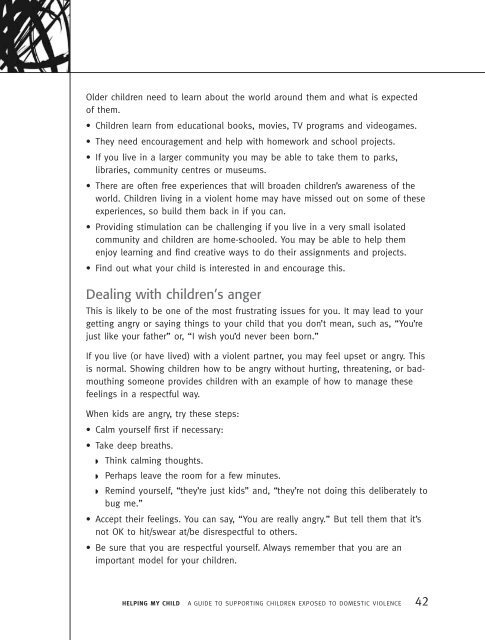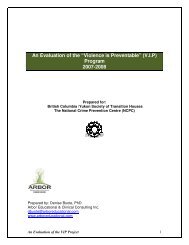a guide to supporting children exposed to domestic violence
a guide to supporting children exposed to domestic violence
a guide to supporting children exposed to domestic violence
Create successful ePaper yourself
Turn your PDF publications into a flip-book with our unique Google optimized e-Paper software.
Older <strong>children</strong> need <strong>to</strong> learn about the world around them and what is expected<br />
of them.<br />
• Children learn from educational books, movies, TV programs and videogames.<br />
• They need encouragement and help with homework and school projects.<br />
• If you live in a larger community you may be able <strong>to</strong> take them <strong>to</strong> parks,<br />
libraries, community centres or museums.<br />
• There are often free experiences that will broaden <strong>children</strong>’s awareness of the<br />
world. Children living in a violent home may have missed out on some of these<br />
experiences, so build them back in if you can.<br />
• Providing stimulation can be challenging if you live in a very small isolated<br />
community and <strong>children</strong> are home-schooled. You may be able <strong>to</strong> help them<br />
enjoy learning and find creative ways <strong>to</strong> do their assignments and projects.<br />
• Find out what your child is interested in and encourage this.<br />
Dealing with <strong>children</strong>’s anger<br />
This is likely <strong>to</strong> be one of the most frustrating issues for you. It may lead <strong>to</strong> your<br />
getting angry or saying things <strong>to</strong> your child that you don’t mean, such as, “You’re<br />
just like your father” or, “I wish you’d never been born.”<br />
If you live (or have lived) with a violent partner, you may feel upset or angry. This<br />
is normal. Showing <strong>children</strong> how <strong>to</strong> be angry without hurting, threatening, or badmouthing<br />
someone provides <strong>children</strong> with an example of how <strong>to</strong> manage these<br />
feelings in a respectful way.<br />
When kids are angry, try these steps:<br />
• Calm yourself first if necessary:<br />
• Take deep breaths.<br />
◗<br />
◗<br />
◗<br />
Think calming thoughts.<br />
Perhaps leave the room for a few minutes.<br />
Remind yourself, “they’re just kids” and, “they’re not doing this deliberately <strong>to</strong><br />
bug me.”<br />
• Accept their feelings. You can say, “You are really angry.” But tell them that it’s<br />
not OK <strong>to</strong> hit/swear at/be disrespectful <strong>to</strong> others.<br />
• Be sure that you are respectful yourself. Always remember that you are an<br />
important model for your <strong>children</strong>.<br />
HELPING MY CHILD A GUIDE TO SUPPORTING CHILDREN EXPOSED TO DOMESTIC VIOLENCE 42






